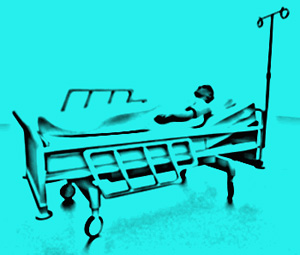|
A Healing Story"What does he need?" "He needs a healing story. Poetry that can fix him." "But he's my father," Michael said. "He'll never listen to my words. He never has before." The doctor moved to the window. He stared out. Michael waited. "This time he has no choice," the doctor said. "It's life or death. He needs your words and you need to offer them, without bitterness. Without regret." These were not the words he actually spoke, of course, but more specifically, those Michael heard. The doctor was no doubt, in reality, being patronizing, attempting to make Michael feel more a genuine part of the situation by playing into those beliefs he professed to everyone without a single syllable's utterance: that words were the universe; symbols, the energy key; that love rode herd upon every well-meant dialogue, and self effortlessly filled in all the margins. "I..." Suddenly Michael wanted to be anywhere but here. This was all so wrong. He hadn't this kind of power. The power to heal. That was for God. He, Michael, was a writer. A storyteller. Nothing more. "I'll do what I can," he said. The next hours passed in a blur. Family members visited. Michael began to feel a strange possessiveness toward his father. He felt elated: empowered in a way he never had before. No one else could help. It was up to him. He knew that these feelings were dangerous. "I don't understand how this happened," his sister said. "I hate seeing him like this." They were seated on two chairs at the foot of the bed. The chairs felt awkward and stiff. They radiated a peculiar discomfort, one that Michael felt compelled to suffer through. Hospitals were like that. They forced you to endure misery. "He's thin and pale and scary," his sister said. "And he looks so weak." His sister's name was Clara. She was older by ten years — a health care professional, a social worker. And yet she reacted as if she'd never seen a sick person before. "They want me to write poetry for him," Michael said. "Or a story. They think it will make him feel better." "That's ridiculous," his sister said. "Besides, you're no writer. If you were a writer you'd have made some money by now." "Don't you believe," Michael said, "that people can heal themselves by force of will? That illness is in the mind? An infection of the spirit?" "I have to go," his sister said. "Tell Mom I'll be back later after work." Michael let her go without another word. If he had spoken one, he would've spoken a thousand. The nurse came in and lifted his father's head to change his pillows. "We have the power," she said, "of life and death." "I know that," Michael said. "Then write the story," she said. "Do your part. Don't let the past create new negativity within you." "No one," Michael said, "has ever understood. I write to find that passion. That richer place." The nurse nodded and left the room. A healing story — what was that? He'd never reached the level of communion he desired with his father. Who ever did? But now there was a chance for something new. A living work that embodied his own goodness. "How can I attain that kind of purity?" he said. His father was asleep, unshaven, withered, his hair greasy, his sheets wrinkled. There was again the strong urge to run. Only the dying lived here. Those willing to give up the moment, to devote their time and energy to these unhealthy pursuits. They were learning a lesson in their souls, Michael knew, but the price was too high. We shouldn't need death to appreciate all that precedes it. "I hear he's maybe never going to wake up ..." This was Gregory, Michael's older brother, an executive with the telephone company, although Michael had long since burned out all ironies regarding communication between the two of them. "... that maybe it's better if he doesn't wake up." Michael ignored him. Why was it written that he, Michael, would be the one positive force in this family? Every conversation began with a defeatist thought given voice. Every moment was irretrievable, and nobody seemed to care. "You got away with things that I never could have at your age. He let you stay out as late as you wanted, bring girls upstairs. He even bought you a car; I had to work for mine." "Maybe he was learning to be a better father," Michael said. "Maybe he just mellowed in the seventeen years between us." "He gave you everything and he never asked for anything." Michael doubted that their father had ever asked Gregory for anything, either. But siblings invariably chose the most expedient path of memory to achieve their desired comparisons. "Maybe by that time," Michael said, "there was less pressure put on me because you were already such a successful businessman." Try as he might, Michael still lost control of his intention, the compliment souring at the end, biting the brotherly urge that fed it. No matter. He existed, as he always had to Gregory, in some half-heard reality which filtered all but the harshest between them. "I'm going to be here for a while," his brother said, "if you want to go and catch some sleep." Michael left only to escape further conversation. He immediately felt guilty being away from his father's side. A healing story. A succession of words to uplift. What kind of power was that? An ability that functioned only when he turned his mind away from it. He could write. Oh, he could certainly do that. But the thoughts were merely inner voices concretized. It was the energy that mattered — the intention that flowed behind the words. An invisible, ephemeral link from person to person. His father was dying. And only Michael could save him. True or false? |
